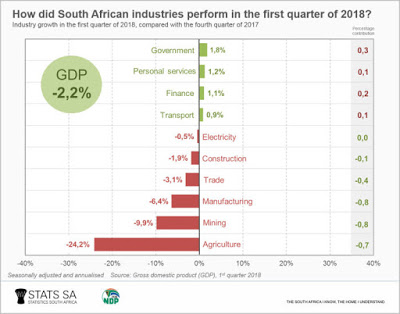South Africa’s Gross
Domestic Product (GDP) suffered worst quarterly contraction in nine years,
shrinking by 2.2 per cent in first quarter, data from Statistics South Africa
showed on Tuesday.
Domestic Product (GDP) suffered worst quarterly contraction in nine years,
shrinking by 2.2 per cent in first quarter, data from Statistics South Africa
showed on Tuesday.
The agency said in Pretoria that the GDP contraction was led by
a slowdown in agriculture and mining, after expanding 3.1 per cent in the final
quarter of last year.
a slowdown in agriculture and mining, after expanding 3.1 per cent in the final
quarter of last year.
According to the agency, this is the largest quarter-on-quarter decline
since the first quarter of 2009, when the economy contracted 6.1 per cent.
since the first quarter of 2009, when the economy contracted 6.1 per cent.
“The real gross domestic product expenditure fell by 2.5 per
cent in first quarter after expanding by 3.1 percent in the third quarter.
cent in first quarter after expanding by 3.1 percent in the third quarter.
“The agriculture sector shrank 24.2 per cent in the quarter due
to poor horticulture output, followed by mining which fell 9.9 per cent and
manufacturing down by 6.4 per cent.
to poor horticulture output, followed by mining which fell 9.9 per cent and
manufacturing down by 6.4 per cent.
“The GDP rose 0.8 per cent on an unadjusted year-on-year basis
in the first quarter, compared with a 1.5 percent expansion in the previous
three months,” the agency said.
in the first quarter, compared with a 1.5 percent expansion in the previous
three months,” the agency said.
The rand weakened by more than one per cent against the dollar
in response.
in response.
Anylysts said that the drop was a reminder to investors of the
huge challenge President Cyril Ramaphosa currently faced to deliver long term
economic growth.
huge challenge President Cyril Ramaphosa currently faced to deliver long term
economic growth.
After Jacob Zuma was forced out as leader by the ruling party in
February, Ramaphosa pledged to clean up governance, deal with high unemployment
and improve basic services, igniting a wave of optimism dubbed: “Ramaphoria”.
February, Ramaphosa pledged to clean up governance, deal with high unemployment
and improve basic services, igniting a wave of optimism dubbed: “Ramaphoria”.
South Africa’s economy has barely grown in the past decade with
fiscal missteps and corruption contributing to weak business and consumer
confidence.
fiscal missteps and corruption contributing to weak business and consumer
confidence.
However, the poor gross domestic output (GDP) in the first three
months of 2018 will erode some of the enthusiasm in South Africa.
months of 2018 will erode some of the enthusiasm in South Africa.
Economists polled by Reuters had expected a quarter-on-quarter
GDP contraction of 0.5 per cent.
GDP contraction of 0.5 per cent.
“Today’s downbeat figure will dampen some of the enthusiasm
surrounding President Cyril Ramaphosa,” Capital Economics senior emerging markets
economist John Ashbourne said.
surrounding President Cyril Ramaphosa,” Capital Economics senior emerging markets
economist John Ashbourne said.
“South Africans themselves were also optimistic; consumer
confidence jumped to an all-time high in first quarter.
confidence jumped to an all-time high in first quarter.
“But this ‘Ramaphoria’ does not seem to have translated into
stronger spending,” he said, adding that a swift turnaround was unlikely.
stronger spending,” he said, adding that a swift turnaround was unlikely.





